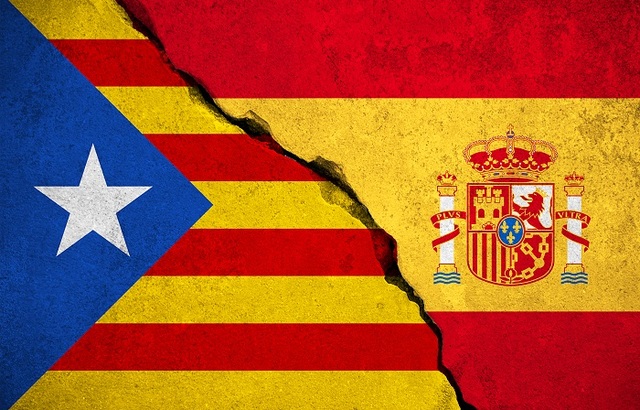With the declaration of independence by Catalonia on Friday, the subsequent dismissal of the Catalan regional government by Spain’s central authorities and the announcement of new elections in the Spanish region, the Catalonian crisis has clearly entered a new phase. But will that be one of continuing escalation, or will we see a gradual restauration of the status quo?
The latter option is clearly what markets prefer, and investors seem to look favourably at the developments in Spain over the weekend. Spanish stocks rallied on Monday, led by Catalonia’s two largest banks Banc Sabadell (+4.5%) and Caixa Bank (+3.8%), following the announcement from Madrid that new elections would be held in Catalonia on 21 December.
“I think the news of new elections is positive. The fact that the pro-independence parties have said they will participate is an indication they are willing to play by the rules,” Marta Campello, a fund selector at Abante Asesores, a wealth manager based in Madrid, told our sister publication Expert Investor.
Independence support drops
Already on Thursday, when Expert Investor organised an investment forum for Catalan investors in Barcelona, it became clear reality was sinking in, also with fervent supporters of independence.


When asked, 40% of those polled were in favour of independence from Spain. That number dropped to a mere 30% when they were asked whether Catalonia would actually be an independent country in five years’ time. These numbers were confirmed by later polls published by the Spanish media, which put support for independence well below 50%.
Buy the dip
Still, Spanish equity markets have strongly underperformed other stock markets in Europe this year, on the back of the recent political uncertainty (see graph). Therefore, Spanish investors are starting to see opportunities again after a few turbulent weeks for local assets, especially equities.

“With the announcement of new elections [on 21 December], the uncertainty is going to be relatively short and polls are yielding good results for the unionist side now. We will see how thing evolve over the next days, but we are more positive at this stage even though you will not always be able to have everything under control.”
One thing that could aggravate tensions and elevate the Catalan question to the European level, something the Catalan nationalists have been trying to do for months, is Catalan president Carles Puigdemont’s apparent intention to apply for political asylum in Belgium, following a statement by the country’s immigration minister that he is welcome to do so.
Campello is also cautiously positive. Two weeks ago, Abante removed a hedge, which effectively reduced their exposure to Spanish equities by half. “We had had this hedge in place since the end of Q2 as we believed risks in Spanish stocks started to outweigh opportunities. But now it’s again a good moment to increase exposure, though I wouldn’t invest simply in the IBEX 35. It’s a tricky index.”
Midcaps, which have also suffered from the political turmoil in the country, are a better option. “There is a lot of value in Spanish companies. The real economy is improving, and Spain is definitely not in an economic crisis anymore. Midcaps, such as construction companies, are a good place to profit from that.”

But those in the eye of the storm are not all quite as sanguine. About half of Catalan investors polled by Expert Investor believe equity markets are complacent about the political risk stemming from the situation in Catalonia, and three in ten investors have reduced their allocation to (Spanish) equities since the contested independence referendum on October 1st.
And the risks that would stem from Catalonian independence are real, of course.
“Let’s be clear, if Catalonia were to break away from Spain it would introduce huge uncertainties into the liability structure of the Spanish state, not to mention be very disruptive to economic growth and this would ordinarily mean a much higher risk premium,” said Chris Iggo, chief investment officer at AXA IM. “If the ECB wasn’t buying or had announced a more rapid winding down of its QE programme, I suspect that Spanish spreads would be much higher today than they are.”





